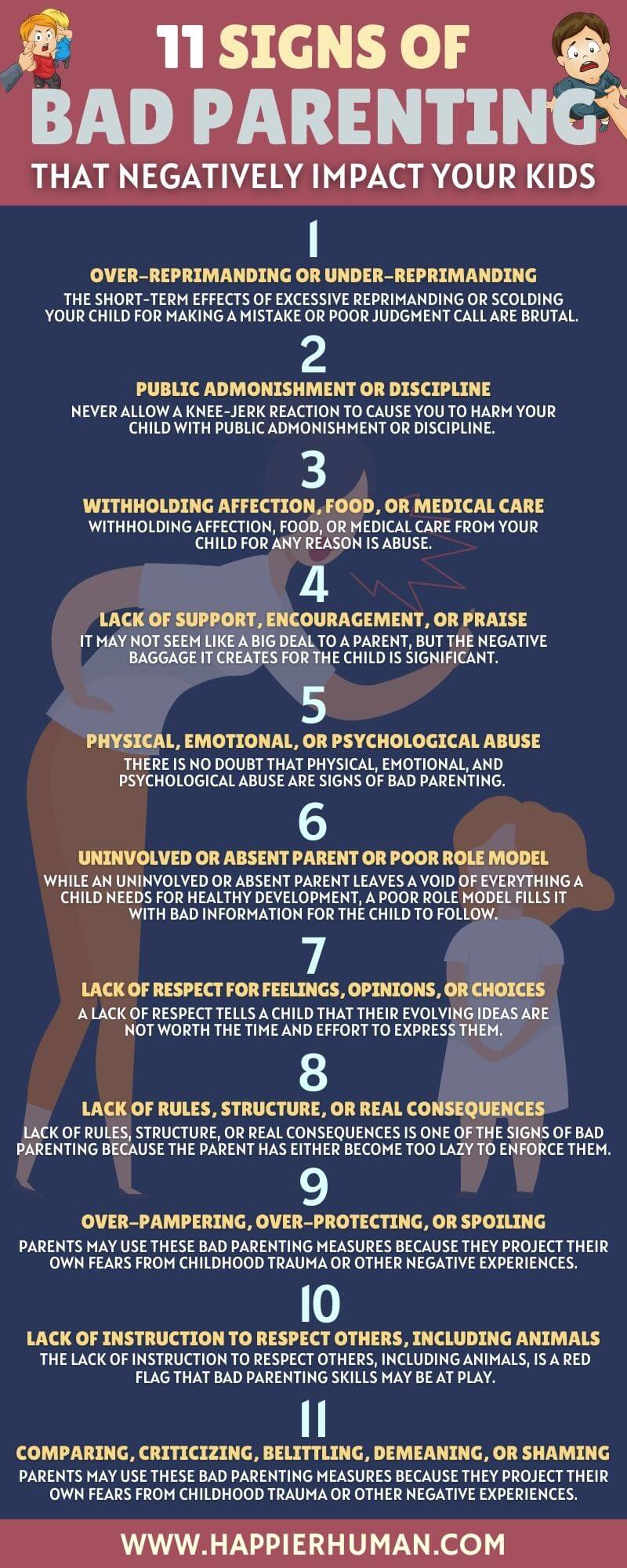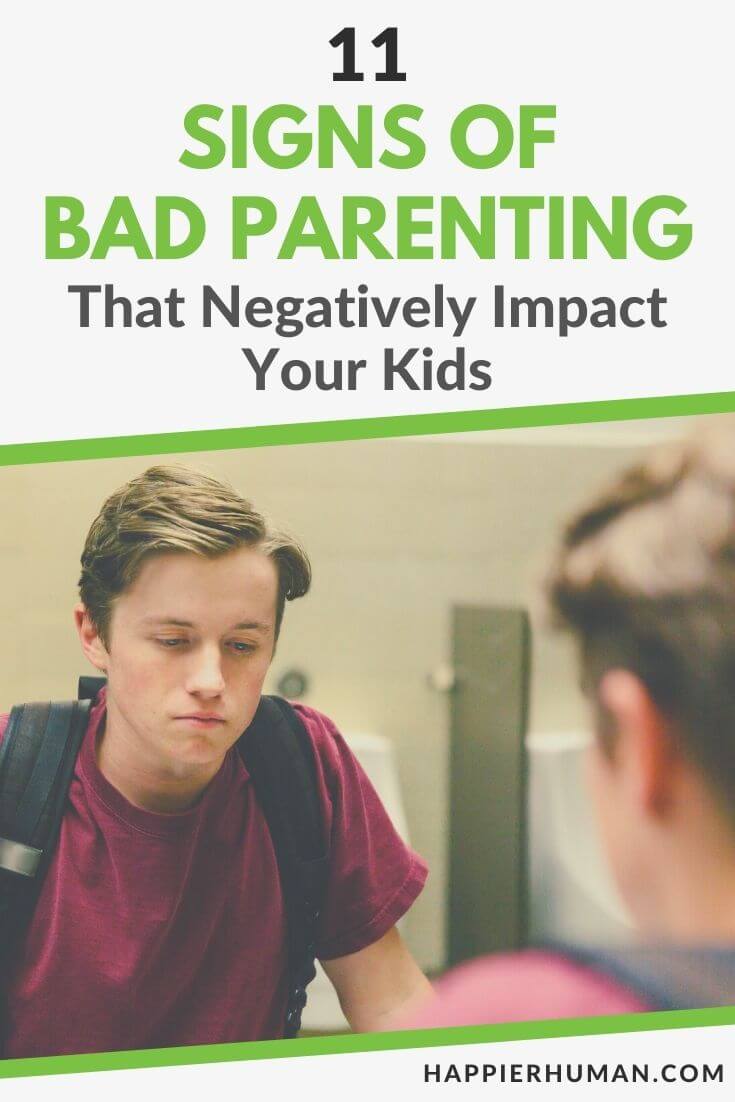Signs of bad parenting are all around you: rude, obnoxious children running rampant through a store or restaurant; a child bullying another child or a parent shaming their child in public.
When you find yourself in a situation where you are witnessing the effects of bad parenting first hand, have you ever stopped to wonder about your own parenting skills? Maybe it’s different when the tables are turned.
This article will help you recognize the signs, the effects on a child, and how you can change.
Signs of bad parenting are indicators that parenting skills are driving in the wrong lane and about to crash into oncoming traffic. They signal not that there is something wrong with the child but that the parent has infused negative baggage into their parenting skills.
Why It's Important to Address Bad Parenting
If the red flags are not addressed and corrected as soon as possible, serious, dangerous, and detrimental consequences may occur. The signs signal threats. The threats are absolutely real.
Whether the signs of bad parenting indicate a set of overbearing parenting skills, or absence of any at all, there is a foundation that it was built upon.
If the foundation is solid, secure and a positive force, everything built on top of it will thrive and succeed beautifully. If the foundation is not strong and positive, everything built above it will crumble when it fails.
Here’s the deal: When you become a parent, no manual comes with the child. Sometimes, elders advise you to “figure it out like they had to do.” What then? You struggle along, doing the best you can do.
If you’ve overcome trauma, illness, or other negative influences in your own childhood, you have nothing to rely on for information other than your own experiences. For many of us, that’s not necessarily a good thing. It leaves us trying to build a sparkling golden tower on a foundation made of mud, muck, and debris. It just doesn’t work.
Another option is to research, do your homework, and get professional counseling. Try that. Your sanity, your kids, and their future are worth the extra effort. After all, most parents have some underlying issues that flow into how they raise their kids.
Causes of Bad Parenting Skills
Some of the primary underlying causes of bad parenting skills include:
You may not have been given a manual, tools, or a support network for good parenting skills, but you can do this with determination and hard work! The information and training are available and easily accessible.
You simply have to research it for yourself, meditate, self-reflect, practice daily, and dedicate yourself to becoming a much better parent, human being, and shining role model to others. Your kids are watching. Your choices will shape who they become as adults. Make it count.
This list of 11 signs of bad parenting is meant to help with self-reflection so you can recognize the flaws, correct them, and restore happiness and harmony to yourself, your child, and the world around you.
Our mission is to help guide you to healing and recovery through an honest mirror of change and hope.
11 Signs of Bad Parenting That Negatively Impact Your Kids
1. Over-Reprimanding or Under-Reprimanding
Over-reprimanding and under-reprimanding a child are equally damaging. A healthy middle ground teaches the child how and why they make a mistake.
Short and long-term effects on children:
The short-term effects of excessive reprimanding or scolding your child for making a mistake or poor judgment call are brutal. Bad parenting comes across as an indication that the child is only valued or identified by the mistakes they make.
Short-term effects include:
Long-term effects on a child involve the humiliation or embarrassment of excessive reprimanding and scolding that override any lesson you intended.
The child may never remember the mistake, but they will forever carry the effects of the scrutiny and punishment within their identity.

Under-reprimanding's short-term and long-term effects swing the pendulum in the opposite direction. It sends a child the message that their mistakes or poor judgment can go without guidance, direction, or consequences. This, too, they will carry into their behaviors as adults.
How to stop the cycle and change:
The best way to stop over-reprimanding or under-reprimanding your child is to plan how you want to handle a situation before it happens. Then, if a circumstance suddenly creeps up, catch yourself before you react.
Determine how to best handle it so that your child learns from their mistake but does not carry any negative repercussions into the future.
2. Public Admonishment or Discipline
Public admonishment or discipline is any open display of correcting a child in front of others. It is never a positive, healthy option or a good parenting skill. If making the child an example to others is the goal, it could cost your child their life.
Short and long-term effects on children:
The short-term effects on children who are publicly admonished involve:
The long-term effects can range from self-esteem issues to more dangerous problems like self-inflicted cutting or suicide. The psychological implications are enormous.
How to stop the cycle and change:
Never allow a knee-jerk reaction to cause you to harm your child with public admonishment or discipline. Take a deep breath. Count to ten. Then, take your child to a private setting and calmly discuss and explain why their behavior is unacceptable.
3. Withholding Affection, Food, or Medical Care
Withholding affection, food, or medical care from your child for any reason is abuse. The only way this is ever acceptable is if a licensed medical doctor has ordered a temporary hold for medical reasons.
Withholding food or medical care may create a sense that the child must go into survival mode to take care of herself or himself.
Short and long-term effects on children:
The short-term effects of withholding affection from a child are profound. They may show up as:
The long-term effects are an emotional, psychological, and physical disconnect from parents. Trust is broken. Skepticism, loneliness, and a feeling of abandonment may lead to serious mental health issues and a breakdown in relationships.
How to stop the cycle and change:
No matter how tempted you are to weaponize affection, food, or medical care to punish or correct your child for a mistake or bad behavior, don’t do it. There are better parenting methods, like an honest conversation or appropriate consequences for the child's age.
4. Lack of Support, Encouragement, or Praise
The lack of support, encouragement, or praise for a child involves things like not helping them with homework, not encouraging them when they feel insecure, or not giving them praise when they’ve made an accomplishment.
It may not seem like a big deal to a parent, but the negative baggage it creates for the child is significant.
Short and long-term effects on children:
The short-term effects may include:
Long-term effects may show up as difficulty creating and maintaining relationships, retaliation against authority figures, or suicidal tendencies. They may also lead to reclusive tendencies and an inability to help others.
How to stop the cycle and change:
If this sign of bad parenting arises on your watch, take a moment to reflect. Ask yourself if you can do better at supporting your child. Then, change it. When you do, watch your child’s demeanor and self-confidence soar.
5. Physical, Emotional, or Psychological Abuse
There is no doubt that physical, emotional, and psychological abuse are signs of bad parenting. No child should have to suffer through it. However, sometimes, the abuse is so subtle or passive that some parents may not realize they are doing it.
Short and long-term effects on children:
The short-term effects of abuse on a child are the immediate wounds, whether it is physical bruising, emotional scarring, or psychological torture. The short-term injuries inflict damage that easily flows over into a lifetime of misery.
Some effects may present as:
The long-term effects of abuse are often recycling and transferring the pain onto others who enter the child’s life.
Partners, spouses, and their own children may suffer the consequences of physical, emotional, and psychological abuse. From there, any number of lifelong effects may manifest, like drug or alcohol abuse or criminal activity.
How to stop the cycle and change:
Do self-introspection. If you could step outside of your body and watch your parenting methods from the ceiling, would you approve of how you deal with your child? Would others?
Place yourself in your child’s shoes. Imagine the pain they feel. Only you can change it all around and make it stop. If abuse is occurring, report it immediately.
6. Uninvolved or Absent Parent or Poor Role Model
While an uninvolved or absent parent leaves a void of everything a child needs for healthy development, a poor role model fills it with bad information for the child to follow.
Either way, if poor parenting skills are not corrected, the child will likely have immense hardships in front of them on life’s journey.
Short and long-term effects on children:
The short-term effects of either an empty chair at the table or a poor role model sitting there leave a child feeling lost, confused, and unworthy of the effort. Sometimes, being a flawed role model is worse than not being there at all.
Other short-term effects may involve:
The long-term effects may be lifelong as the child struggles to figure their way along independently. A poor role model may give the child the only information to survive, which is not good.
It can lead to distrust, insecurity, and a mindset that no one cares about them. They may even develop a lack of empathy towards others because no one seemingly cared for them.
How to stop the cycle and change:
First, if you are an uninvolved or absent parent, show up and make it count for good. Secondly, if you are a poor role model, get help. If you carry negative baggage, don’t make your child pay the price.
Find healing methods, meditate, and correct your role model position in your child’s life. You don’t have a choice.
7. Lack of Respect for Feelings, Opinions, or Choices
Lack of respect for your child’s feelings, opinions, or choices is a sign of bad parenting because it demonstrates that you have no faith in your child or their growing process. It is a selfish error.
A child can only learn to express feelings, form opinions, or make choices by trial and error. Patient guidance can help them excel in this area.

A lack of respect tells a child that their evolving ideas are not worth the time and effort to express them. This will create deep-seated issues that may weave throughout the child’s life.
Short and long-term effects on children:
The short-term effects of a lack of respect for a child’s feelings, opinions, or choices are incredibly harmful to your child.
Short-term effects include:
Long-term effects involve distrusting authority figures, teachers, employers, co-workers, and others. The resulting self-esteem issues may cause severe psychological problems or lead to thoughts of criminality.
How to stop the cycle and change:
Calmly listen to your child and allow them to express their ideas without criticism or condemnation. Ask questions about their thought process to get them to think about how they arrived at their ideas.
If corrections are needed, patiently explain to your child a better way to think about the concepts without deeming their thoughts “wrong.”
8. Lack of Rules, Structure, or Real Consequences
Lack of rules, structure, or real consequences is one of the signs of bad parenting because the parent has either become too lazy to enforce them, or they just don’t have any interest in doing it. Having no structure is as bad as having terrible structure.
Short and long-term effects on children:
Short-term effects of a lack of rules, structure, or real consequences are:
Long-term effects will produce an adult bully who shows no appreciation for things earned or respect for those who labor to obtain them. It may even develop into mental illness or psychological tendencies that are hard to break.
How to stop the cycle and change:
Consult with a parenting expert who can help you sort out why you have not already applied rules, structure, or real consequences to your arsenal of parenting skills. There are counseling options for any budget.
Then, have a sit-down discussion with your child to explain the plan and any consequences, so there are no surprises about what your child can expect. Be straightforward and respectful.
Develop a morning routine for your kids is a good start. Take a few minutes to watch the video below to learn the 6-step process you can use to create a great morning routine for your kids.
9. Over-Pampering, Over-Protecting, or Spoiling
Over-pampering, over-protecting, or spoiling your child is terrible parenting for several reasons. Parents may use these bad parenting measures because they project their own fears from childhood trauma or other negative experiences.
Often, they don’t realize that overdoing it with their kids will have awful short-term and long-term effects. Consider the following repercussions.
Short and long-term effects on children:
Some of the short-term effects include:
The long-term effects can be staggering and permanently imprinted into the child’s brain, personality, and identity. The child’s expectations of being pampered will carry over into their adult relationships, career, and how they raise their own children.
How to stop the cycle and change:
When you realize you are over-pampering, over-protecting, or spoiling your child, take time to reflect on why you do it, what you hope to accomplish, and how it affects your child. Meditate and research things you can do to correct bad parenting.
If you need help, there are resources available to help you conquer this task and raise a child who appreciates and earns great and beautiful things in life. This is fixable.
10. Lack of Instruction to Respect Others, Including Animals
If you have ever noticed loud, unruly, disrespectful kids running around a restaurant screaming and touching things they shouldn’t, you were probably looking at bad parenting. It may not be the sole cause, but it is often the primary cause.
The lack of instruction to respect others, including animals, is a red flag that bad parenting skills may be at play. Reasons parents do this could be laziness or their own sense of entitlement passed on to their kids.
Short and long-term effects on children:
A few short-term effects may involve:
Long-term effects will develop from carrying the short-term aspects into a lifelong mentality of disrespect toward others. Ego issues may infuse into relationships and create lasting problems.
How to stop the cycle and change:
Depending on how long a parent has allowed the lack of instruction to respect others to happen and how embedded it has become in a child’s daily routine, a parent may not be able to change this all alone successfully. It may take professional advice and guidance from a licensed counselor.
11. Comparing, Criticizing, Belittling, Demeaning, or Shaming
One of the biggest pitfalls in parenting is comparing, criticizing, belittling, demeaning, or shaming a child into conforming, behaving, or producing as the parent wishes. Children listen. They follow their role models.
Even the slightest murmur that diminishes a child’s identity or efforts can be detrimental. It is even worse for a sensitive child.
Short and long-term effects on children:
Short-term effects may show up as:
Long-term effects will spin-off from the short-term effects. The results will manifest in more significant ways and may include suicidal thoughts. As an adult, this child may be unable to accept any criticism, correction, or guidance.
How to stop the cycle and change:
It’s easy to say, “Just stop it!” However, many parents may not even realize the severity of this flawed parenting measure. There is nothing good that will ever come from this type of punishment.
If you want to change, meditate, self-reflect on why you do it, and determine to stop harming your child this way. Talk to your child, apologize, and listen to their feelings and thoughts. Treat them as the precious human beings they are. If you need more help, get professional counseling and therapy.

Children shaped and developed from bad parenting skills often struggle through life, self-sabotaging opportunities, failing in relationships, causing self-harm, and many other issues.
Whether you are an adult child of bad parenting or find yourself using bad parenting, there is hope.
There is help for you to let go of the hooks that have you trapped in a dysfunctional cycle. You can break free! You can free your children! Peace, love, and joy are just ahead!
Additional Resources to Help Address Bad Parenting
Final Thoughts on Signs of Bad Parenting
Signs of bad parenting are symptoms or markers of something deeper going on. They are not set in stone, and they don’t have to be permanent.
The situation does not have to stay the way it is. You can change it! You can stop the cycle and begin healing by reaching out for help.
If you just try, you will be amazed at how much better your parenting skills will become and how much happiness you and your child can experience together. It will take hard work and dedication, but there is hope. You can do this!
For more encouragement, take a look at Positive Parenting Solutions Review: Is It Worth It? Life is about to get better.
Now, if you're looking for more resources to help you be a better parent (and person!), be sure to check out these articles:
- How to Reparent Yourself: A 7-Step Guide
- 11 Steps to Stop Living in the Past and Move Forward
- 21 Simple Ways to Live in the Present Moment Right Now
Finally, if you want to level up your parenting skills, then check out this resource that will show you how to get your kids to listen WITHOUT yelling, nagging, or losing control.

Rain Story is an author and screenwriter. She is an alumna of the University of Arkansas at Little Rock, the University of New Mexico, and the University of Kentucky. She earned two B.A.s and four years of graduate studies in literature, languages, and creative writing before personal tragedies pulled her away from her graduate work. She is also a Donaghey Scholar and fellow of the William G. Cooper, Jr. Honors Program in English.


